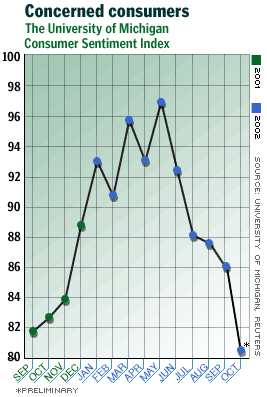NEW YORK (CNN/Money) - A closely watched measure of consumer confidence fell sharply in the United States in October, a published report said Friday, raising questions about consumer spending, a pillar of the broader economy.
The University of Michigan's consumer sentiment index fell to 80.4 from 86.1 in September, according to a Reuters report. Economists, on average, expected a reading of 85.2, according to Briefing.com. The survey results, available only to paying subscribers, will be revised at the end of the month.

The report had little impact on U.S. stock prices, which rallied for a second day in early trading. Treasury bond prices were lower but off their worst levels of the session.
Consumer spending is watched closely since it fuels about two-thirds of the nation's economy. Robust spending has helped carry the United States through a recession that began in March 2001, last year's terror attacks, more than 1.8 million layoffs, as well as tumbling stock prices and worries about corporate malfeasance.
The Federal Reserve helped keep consumers spending by cutting its target for a key short-term interest rate to the lowest level in 40 years. That rate, combined with weakness in the economy and the stock market, helped drive other interest rates lower, cutting borrowing costs.
Most importantly, mortgage rates plunged to record lows, fueling a refinancing boom that lowered many homeowners' monthly payments and freed up cash for spending.
But economists have grown increasingly worried about the weak job market as the economy has recovered. Persistent stock-market weakness and fears about a possible war in Iraq have discouraged businesses from spending money or hiring new workers, and economists fear that prolonged labor market woes, combined with record levels of consumer debt, would cause consumers to pull back.
That fear seemed to be justified by a startling drop in the expectations component of the Michigan sentiment report, which measures how consumers think the economy will perform in the next 12 months. The index fell to 72.4 from 79.9 in September, Reuters said.
The current conditions index was a little stronger, dropping to 92.9 from 95.8, according to Reuters.
Still, economists often warn against placing too much importance in Michigan's initial monthly survey, since it's based on telephone interviews with a relatively small sample of about 300 people. Thus, it isn't always accurate at predicting how consumers will act, some analysts say.
In a separate report, the government said retail sales fell 1.2 percent in September. That sounds alarming at first blush, but most of that came from a steep drop in auto sales after a glut of car-buying in the summer. Excluding auto sales, which account roughly for a quarter of the total, retail sales edged up 0.1 percent.

|

